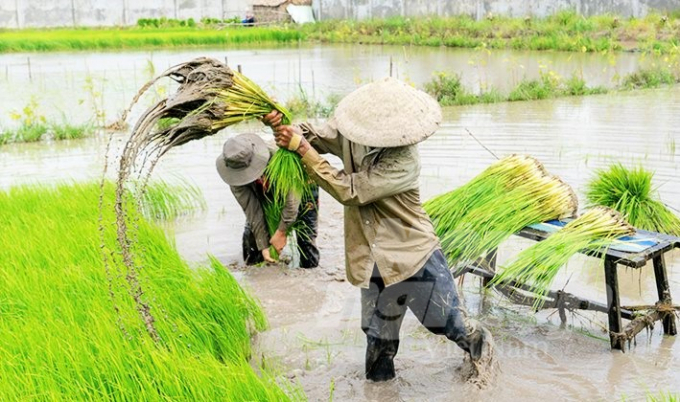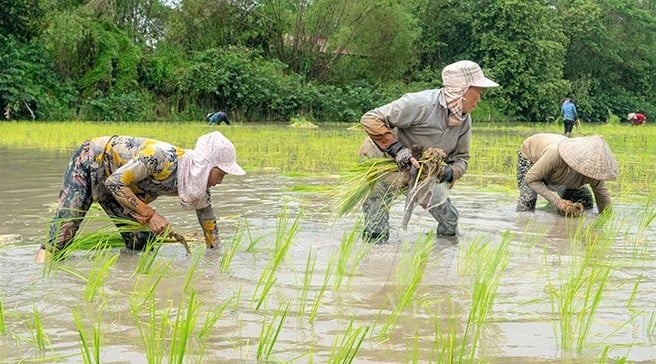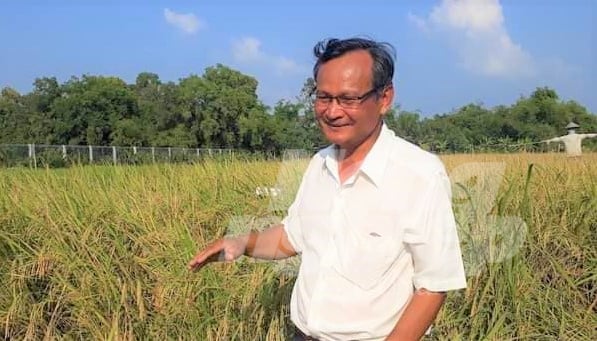June 27, 2025 | 12:56 GMT +7
June 27, 2025 | 12:56 GMT +7
Hotline: 0913.378.918
June 27, 2025 | 12:56 GMT +7
Hotline: 0913.378.918

Rice cultivation without chemical fertilizers at Tu Viet farm. Photo: LQV.
Director of Chau Thanh district's Department of Agriculture and Rural Development (Kien Giang province) Le Quoc Viet said farmers must take account of the economic efficiency instead of the high yields then they can reduce fertilizer use.
Intensive farming, a way of producing large amount of crops for many consecutive years can damage the fertility of soils. Therefore if the amount of chemical fertilizers is reduced the rice yields will fall as a result. However it's necessary to find a way to reduce fertilizer use without sacrificing food production.
According to Viet to cut fertilizer use in rice cultivation farmers must adopt technical measures properly, not apply intensive farming practice too often so that the soil have time to be nourished by organic matters. Before planting seeds farmers must prepare soil carefully, applying sowing rates at lower than 100kg/ha, adopting advanced practices like SRI, IPM.
Lower sowing rates will help reduce fertilizer and pesticide uses. Due to less fertilizer use it's necessary to determine the most suitable time and proper method of fertilizer application to increase fertilizer use efficiency.
Viet added the amount of synthetic fertilizers could be reduced to 25-39kg/cong (or half the normal amount).Although the yield could shrink to 300 -500 kg per hectare economic efficiency was still ensured.

Viet's rice field applied traditional farming method combined with aquaculture to gain higher economic value. Photo: LQV.
Viet himself has nearly applied no chemical fertilizers on his rice field.
Viet said since 2017 he has converted more than 2.5 hectares of his family's rice land in Minh Phu from cultivating two rice crops per year into rice-fish farming system.
He chose indigenous rice varieties to grow on his field, absolutely saying no to pesticides in cultivation. Instead he adopted ecological measures, planting flowers near the field to attract useful insects as a method of controlling pests. He raised ducks for snail control while fish in the integrated farming system help kill the plant-hoppers. Particularly he made compost from organic residues from his farm to fertilize the rice field.
Only when the rice field was flood or submerged due to heavy rain in the early stage of rice plant growth did he use 2-3kg of NPK fertilizer mixed with 10kg of vermicompost and spread all over the field. Most of the time rice plants grew naturally until the harvest.
Viet also worked with other farmers in the district to apply integrated rice and aquaculture farming method on an area of over 40 hectares. The model was enthusiastically supported by farmers. Because of rice cultivation without chemical fertilizers, pesticides and without intensive farming method there were three benefits including healthy soils, healthy rice plants and healthy farmers.

Despite adopting traditional farming method without chemicals Viet still harvested 3 to3.5 tons of rice per hectare depending on rice varieties. Photo: LQV.
According to a study conducted by a team of researchers at the International Rice Research Institute (IRRI) the rice crop needs the following uptake of N, P and K to produce 1 ton of grain per hectare: Nitrogen (N):15 kg. Phosphorous (P): 6 kg. Potassium (K): 18 kg. The soil itself contains the macronutrients that are enough to sustain a certain rice yield (ranging from 2 tons to 4 tons per hectare) depending on types of soil.
Thus, fertilizers only help increase the yields but not decide the crop production as a whole. Amid the massive rally in fertilizers, rice farmers should choose the best way to apply fertilizer to ensure desired crop productivity.
Traditional farming method uses indigenous rice cultivars, uses no chemical fertilizers. Therefore Viet could harvest only 3 tons to 3.5 tons of rice per hectare depending on rice varieties. But in return, he could sell his rice for higher prices plus additional income from fish and duck farming.
Translated by Mai Tham
/2025/06/17/3942-2-143243_548.jpg)
(VAN) Recently, in Sweden, the Secretary of the Binh Dinh Provincial Party Committee presented the Investment Registration Certificate for the 'Polyester Fabric Recycling Complex' project to SYRE Impact-AB Company.
/2025/06/12/3721-2-202745_83.jpg)
(VAN) TH made an impression at Seoul Food 2025 with its line of natural beverages, paving the way for Vietnamese food products to enter the South Korean market.

(VAN) Soc Trang's success in rice exports stems from a strategy of developing fragrant and specialty rice cultivation areas and standardizing production toward low-emission practices.
/2025/06/11/1311-5-120811_839.jpg)
(VAN) The pig farming industry is facing the challenge of comprehensive restructuring to meet requirements for quality, safety, traceability, and market expansion both domestically and for export.

(VAN) Vietnam considers participating in ALGROALBA in order to expand agricultural production, coordinate the assessment and effective exploitation potential land.
/2025/06/05/5314-1-184727_407.jpg)
(VAN) From seemingly worthless fish scales and skin, enzymes and lactic ferments can transform by-products into peptides, opening a sustainable, effective business direction and elevating Vietnamese seafood.

(VAN) TTC AgriS and IFC signed a strategic partnership to develop a sustainable agricultural value chain, aiming to achieve the Net Zero target by 2035.